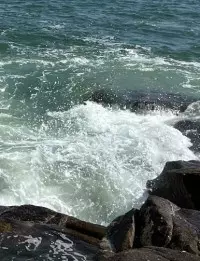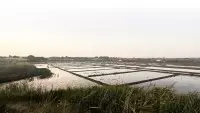
Why is the sea salty?
It's a question we're bound to have asked ourselves one day, while swimming in the sea or ocean: but where does that eye- and tongue-stinging salt content come from? Yet another feat of nature, whose secrets we reveal in this article.
_____
Water is the primary element in Guérande's salt marshes.
It's from Brittany's rough ocean that our natural salt draws all its richness and character.
_____
Summary
Where does the salt in our oceans come from?
If salt is appreciated for spicing up our meals, it is above all essential to the ocean's equilibrium.
Two natural phenomena help us understand why seawater is salty. First, we need to look at how rainwater travels. First, it's important to note that carbon dioxide in the air mixes with rain on its journey to earth, making it naturally acidic. Once it has fallen, the rain runs off steep rocks and becomes loaded with minerals such as sodium, calcium, magnesium and potassium. On evaporation, chlorine and sodium combine to form sodium chloride, which is the salt found in our seas and oceans. It's when clouds discharge over the seas that sodium chloride salinizes them.
The other reason for the salinity of the oceans lies several thousand meters away from the seabed and its hydrothermal springs. In fact, the ocean floor is infiltrated by fissures that release heat emanating from the magma at the earth's core. This phenomenon triggers multiple chemical reactions, resulting in the loss of minerals to metallic elements in the surrounding rocks. It creates a source of life essential to the ecosystems living in the abysses, which have no access to light. The salts released by this mechanism are the result of underwater volcanic eruptions. They then diffuse into our oceans via warm currents.
.Did you know?
If you put together the amount of salt present in our oceans, it would form a thickness of over 166 meters!
Why aren't lakes and rivers salted?
Although we might have been led to believe that lakes and rivers should be naturally salty, the terrain and nature's cycle have decided otherwise, or almost. Lakes are fed by water that runs off smooth rock, thus generating a lower salt content.
As for the rivers that feed our oceans, their supply of mineral salts also remains very low. The simple reason for this is that sodium chloride does not remain stagnant in freshwater, but returns naturally to the ocean.
.Why are some seas saltier than others?
The Dead Sea and its extraordinary landscape have all the makings of something extraordinary. However, the only thing it has in common with the sea is its name and salinity. This lake, located 400 meters below sea level, is shared by Israel, Jordan and the West Bank, and offers an unparalleled experience to those who go there.
With a salt content approaching 34%, i.e. 275g , of salt per liter of water compared with 35g for a liter of seawater, it's impossible for any form of life to develop there. One of the reasons the water is so salty is that the Jordan River, which used to irrigate the lake, has now been diverted. In addition, the region's very hot climate generates substantial evaporation, a combination of circumstances that clearly accentuates the salinity of the environment, whose water level drops by more than a meter a year.
.A quality salt born of the balance between Man and Nature.
Attached to preserving the heritage of the Guérande territory and the cultivation of its salt shaped by the sea spray of the Atlantic coast, the Le Guérandais salt workers mobilize to ensure the perfect balance between Man and Nature.
Is sea salinity increasing?
While the water cycle constantly feeds the oceans, their salt content remains stable. Unlike water, salt does not evaporate. But as you know, thanks to the wind and the Earth's rotation, the ocean is constantly in motion, and it's through this phenomenon that ocean currents move salts to areas of lower salinity. These areas of lower salinity are simply the result of heavy rainfall, or simply due to the discharge of fresh water.
Just like the sea's salinity level, the ancestral know-how of Le Guérandais paludiers has remained unchanged for millennia. Harvested by hand, our natural salt is not washed after harvesting, and no additives are added to preserve its distinctive, 100% natural flavor.




